Dahab
Today was a travel day, as we left Luxor in the morning for Dahab. Other than the flight being delayed about an hour, the trip was fairly pleasant and on a relatively new airplane, putting to rest our fears of a repeat of the dilapidated planes in Indonesia. Travel time is a little less than an hour, so by the time we reach cruising altitude, it is pretty much time to start the descent.
The airport is in Sharm el-Sheikh, about 60 miles south of Dahab, so for the final leg we need to find a taxi. Unlike Cairo, there are plenty out front of the airport, but we know from some articles we printed from Wikitravel, that we are in for a treat when it comes to negotiating a price.
The opening volley is 350 Egyptian pounds (about 70 US dollars), almost double what the article says we should pay. We manage to beat this down to 250, but there is clearly some collusion here with drivers shouting to each other in Arabic to make sure no one cuts the price too low. Irritated that we are being held hostage by the cab mafia, Ang sees a minivan from the Novotel in Dahab and wanders over to ask the driver if we can pay him to take us (since he is obviously going anyway). It looks like he will, until one of the cabbies comes over a yells at him for a while and he finally says no.
Now more determined than ever to win this battle (I think Ang will sleep on bench at the airport rather than give these drivers satisfaction), we regroup to consider our options. We know there is a bus from Sharm el-Sheikh to Dahab if we can get to the bus station from the airport so we ask about that. Half the cabbies tell us the bus station is closed (which we know is not true) and the others offer to take us for 100 Egyptian pounds, which is even more inflated that the price to Dahab.
Finally, the tide turns when we see the shuttle for the hotel we will be staying at when we move back to Sharm in a week. We tell the driver we are going to be guests, but that today we would just like to get into Sharm so we can go to the bus station. He agrees, and now we have leverage. After that, the price for a taxi direct to Dahab drops into the range we find acceptable and we prepare to be on our way, with one interesting twist. Not thrilled about having to drive all the way to Dahab for the fare we negotiated, the driver goes over to the Novotel minibus and “sells” us to the bus driver for what looks like 40 pounds.
The ride to Dahab takes about a hour (although it ends up taking us two as the driver took us along on some errands), and while it is all desert, it is more mountainous than the desert around Abu Simbel, so actually quite interesting. We try to get some pictures from the car, but none of the really turned out.
From all that we read before coming to Egypt, Dahab is an ideal place to do not much of anything. It is an old fishing village that hasn’t been built up as a tourist destination like Sharm, so still retains some of its original charm. It is well know by backpackers, divers and windsurfers, so quite laid back, and without the big resorty feel.
Our hotel ends up being about five miles from town, which is definitely a negative, as we much prefer to be able to walk into town for meals and shopping rather than being stuck on the hotel grounds, but there is a shuttle that runs a couple of times a day, so that helps. Since the next one isn’t for several hours though, I decide it would be a good idea to walk to town along the beach, which the concierge says is about four miles.
I’m way to stubborn to admit it at the time, but this was not one of my finer decisions. Parts of the beach are fenced off, and once you leave the shore, nothing is clearly marked, so taking into account a few double-backs and a pretty optimistic estimate by the concierge, I think we end up walking closer to six miles by the time we arrive. It is also quite windy today which, on the one hand, keeps it from getting to hot, but on the other is a bit like pouring lemon juice on a cut (where the cut in this case is my travel buddy who is already unhappy about embarking on this poorly thought out walk in the first place).
After a few hours wandering around the town and some dinner, we find a cab to take us back to the hotel. There is a small incident where our driver throws the cab into reverse and jumps out to rumble with another driver who thins he stole his fare, but we are becoming immune to such things, and wait patiently for some of the locals to hold the drivers back and talk them in from the ledge.
Tomorrow we will start to get the lay of the land here and figure out what all we want to try and do. The original plan was to use this as a base to do trips to Mount Sinai and Jordan, and maybe to do some diving, so we’ll see how that all works out in the morning.


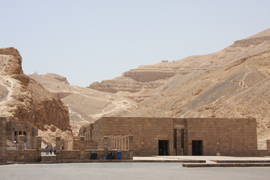 Our next stop is the Valley of the Kings, which of course is famous as the location of King Tutankhamun’s tomb. It is only about 10am, but already the heat is unbelievable (Susan, its hot enough here you could probably get by with just a long sleeve shirt ☺ ). The tombs themselves, while normally quite stifling, are actually a pleasant break as they are in the shape, and despite having little circulation and being stuffed with people, are actually cooler. The entry ticket includes access to three tombs (out of the 12 or so that are open to the public at any given time), and our guide recommends three from the Ramses line as being the best (back at the boat we see that our guide book recommends three others so I think the guides just like to pick the closest ones).
Our next stop is the Valley of the Kings, which of course is famous as the location of King Tutankhamun’s tomb. It is only about 10am, but already the heat is unbelievable (Susan, its hot enough here you could probably get by with just a long sleeve shirt ☺ ). The tombs themselves, while normally quite stifling, are actually a pleasant break as they are in the shape, and despite having little circulation and being stuffed with people, are actually cooler. The entry ticket includes access to three tombs (out of the 12 or so that are open to the public at any given time), and our guide recommends three from the Ramses line as being the best (back at the boat we see that our guide book recommends three others so I think the guides just like to pick the closest ones).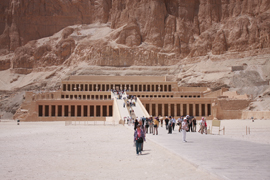 Next up is the mortuary temple of Queen Hatshepsut, one of the few female pharaohs in Egypt. This is another building that gets a lot of air time, but again, seeing it up close and getting a sense for the scale provides a whole new perspective. Of all the places we have been today, this is the only one where we are allowed to take pictures (other than from the parking lot), so we collect quite a few of different parts of the structure.
Next up is the mortuary temple of Queen Hatshepsut, one of the few female pharaohs in Egypt. This is another building that gets a lot of air time, but again, seeing it up close and getting a sense for the scale provides a whole new perspective. Of all the places we have been today, this is the only one where we are allowed to take pictures (other than from the parking lot), so we collect quite a few of different parts of the structure.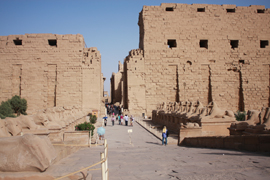
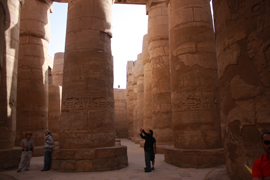
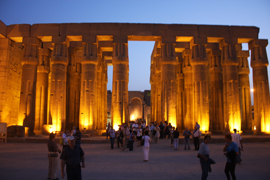
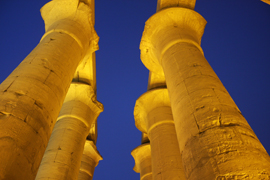
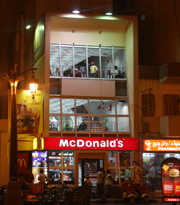 Worn down from a very long day, we walk back towards our boat, passing by a McDonalds that we had to take a picture of for Sammy (they have McYum Yums here Sammy!). Tomorrow we check out for real and move over to our hotel. I am hoping that the connectivity there is better so we can upload all of our pictures so far. If we can, they will be
Worn down from a very long day, we walk back towards our boat, passing by a McDonalds that we had to take a picture of for Sammy (they have McYum Yums here Sammy!). Tomorrow we check out for real and move over to our hotel. I am hoping that the connectivity there is better so we can upload all of our pictures so far. If we can, they will be 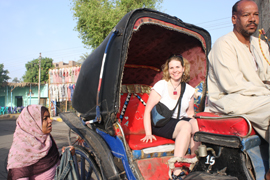 Sure enough, one of the guides for an Australian couple offers to at least help us arrange to get from the boat to the temple site without getting ripped off by the carriage drivers (the temple is about two miles away and transportation for everyone is horse-drawn carriage). We are soon on our way, and the driver offers to let me join him up front and passes over the reins. The horse has probably made this trip a few hundred times, so I figure, what could go wrong?
Sure enough, one of the guides for an Australian couple offers to at least help us arrange to get from the boat to the temple site without getting ripped off by the carriage drivers (the temple is about two miles away and transportation for everyone is horse-drawn carriage). We are soon on our way, and the driver offers to let me join him up front and passes over the reins. The horse has probably made this trip a few hundred times, so I figure, what could go wrong?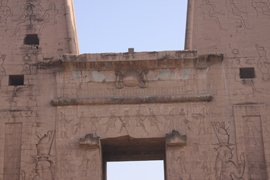
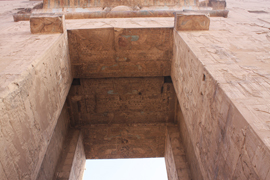
 An hour or so down the road, travel buddy at my side with her head tilted back and mouth open in a quiet snore, the sun starts to rise over the desert and two thoughts come to mind as I watch. The first is that the desert is surprisingly beautiful, particularly in the early light when the colors are most vibrant. The second is that there is absolutely nothing out there. There are no cactuses, no tumbleweeds rolling by, not even a few scraggly plants eeking out a basic existence. As far as the eye can see in any direction, there is only rock and sand. Unless there are reports of Jawas in the area, the convoy is definitely overkill.
An hour or so down the road, travel buddy at my side with her head tilted back and mouth open in a quiet snore, the sun starts to rise over the desert and two thoughts come to mind as I watch. The first is that the desert is surprisingly beautiful, particularly in the early light when the colors are most vibrant. The second is that there is absolutely nothing out there. There are no cactuses, no tumbleweeds rolling by, not even a few scraggly plants eeking out a basic existence. As far as the eye can see in any direction, there is only rock and sand. Unless there are reports of Jawas in the area, the convoy is definitely overkill.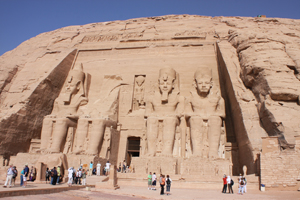
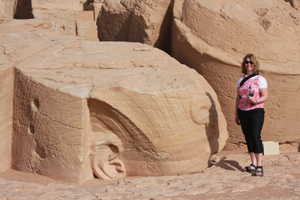
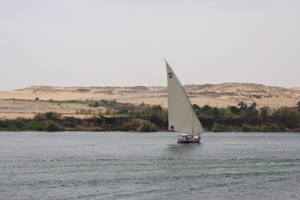 Our itinerary is to spend the next three days making our way slowly down the river to Luxor, stopping along the way to visit a few temples. Thankfully, given our early start, there is only one stop planned at the end of the day, so we are able to just relax and watch the countryside go by from our faux patio (doors, but nowhere to actually stand without ending up in the river). The boat is fairly large and there is a pool and bar on the top deck, but we just don’t have it in us to take advantage.
Our itinerary is to spend the next three days making our way slowly down the river to Luxor, stopping along the way to visit a few temples. Thankfully, given our early start, there is only one stop planned at the end of the day, so we are able to just relax and watch the countryside go by from our faux patio (doors, but nowhere to actually stand without ending up in the river). The boat is fairly large and there is a pool and bar on the top deck, but we just don’t have it in us to take advantage.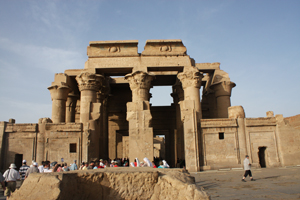 In isolation, Kom Ombo would definitely be an impressive sight, but it has been a long day, and after cramming in a lot of sights in a handful of days, one temple is starting to blur into the next, so we don’t spend too much time wandering around, taking a few pictures before heading back to the boat. On the way, I get to thinking having a couple cold beers in the fridge might be nice given the heat, so stop at one of the shops along the waterfront. They ask if we want beer, and lo and behold I do, so I say sure. I am quickly escorted to the back of the store where we conduct some business and they stuff my purchase into my backpack along with some tips on what to say to the police if they stop me. Needless to say, these may be the last two beers I buy in Egypt.
In isolation, Kom Ombo would definitely be an impressive sight, but it has been a long day, and after cramming in a lot of sights in a handful of days, one temple is starting to blur into the next, so we don’t spend too much time wandering around, taking a few pictures before heading back to the boat. On the way, I get to thinking having a couple cold beers in the fridge might be nice given the heat, so stop at one of the shops along the waterfront. They ask if we want beer, and lo and behold I do, so I say sure. I am quickly escorted to the back of the store where we conduct some business and they stuff my purchase into my backpack along with some tips on what to say to the police if they stop me. Needless to say, these may be the last two beers I buy in Egypt.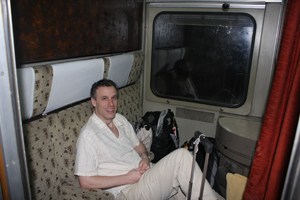 We quickly find our cabin, and are happy to see that it does only contain two bunks as promised (we have heard many stories of reservations for two berth cabins turning into four berth cabins upon arrival complete with strangers). However, that is pretty much all there is, as the cabin is no more than 5 feet across and slightly more than 6 feet long (the latter I confirm when I turn in for the night and am able to fit it perfectly). The upside is that as a night train, we will be sleeping 80% of the time anyways, so won’t miss the space much.
We quickly find our cabin, and are happy to see that it does only contain two bunks as promised (we have heard many stories of reservations for two berth cabins turning into four berth cabins upon arrival complete with strangers). However, that is pretty much all there is, as the cabin is no more than 5 feet across and slightly more than 6 feet long (the latter I confirm when I turn in for the night and am able to fit it perfectly). The upside is that as a night train, we will be sleeping 80% of the time anyways, so won’t miss the space much.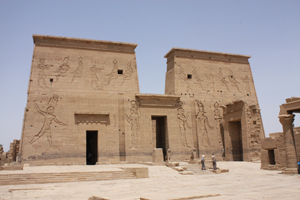
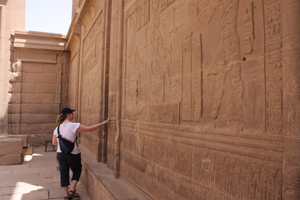
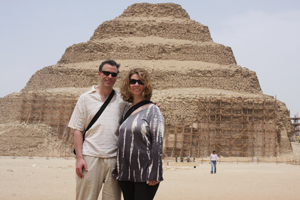 Saqqara is most well known as the place, where the first pyramid was built for the pharaoh Djoser, by his architect Imothep (who despite some bad PR in The Mummy, was pretty famous in his own right). This pyramid is known as the Step Pyramid, as it was built as a series of small square platforms on top of one another rather than the straight-sided versions that came later. The pyramid itself was part of a large complex of buildings, such as temples the pharaoh would use in his afterlife, and tombs for the nobility of the time, who were allowed to be buried near the pharaoh. A handful of later pharaohs also built their pyramids at Saqqara, although at a time when Egypt was waning in wealth and power, so none of them were equal in size to the Step Pyramid and attract little attention.
Saqqara is most well known as the place, where the first pyramid was built for the pharaoh Djoser, by his architect Imothep (who despite some bad PR in The Mummy, was pretty famous in his own right). This pyramid is known as the Step Pyramid, as it was built as a series of small square platforms on top of one another rather than the straight-sided versions that came later. The pyramid itself was part of a large complex of buildings, such as temples the pharaoh would use in his afterlife, and tombs for the nobility of the time, who were allowed to be buried near the pharaoh. A handful of later pharaohs also built their pyramids at Saqqara, although at a time when Egypt was waning in wealth and power, so none of them were equal in size to the Step Pyramid and attract little attention.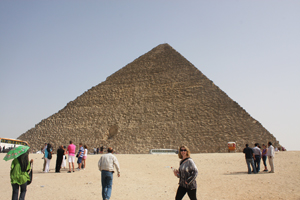 We arrive at Giza at little after 1pm, and despite seeing the pyramids for two days already from our balcony, nothing could prepare us for seeing them up close. They are simply massive, and as we walk around them listening to our guide talk about the history, I can’t stop staring, trying to imagine how the ancient Eqyptians could have possibly built something of this scale. Mohamed reminds us that the pyramids at Giza were built around 2500 B.C., so that by the time the Chinese were building the Great Wall, the buildings I am staring at had already survived over two thousand years.
We arrive at Giza at little after 1pm, and despite seeing the pyramids for two days already from our balcony, nothing could prepare us for seeing them up close. They are simply massive, and as we walk around them listening to our guide talk about the history, I can’t stop staring, trying to imagine how the ancient Eqyptians could have possibly built something of this scale. Mohamed reminds us that the pyramids at Giza were built around 2500 B.C., so that by the time the Chinese were building the Great Wall, the buildings I am staring at had already survived over two thousand years.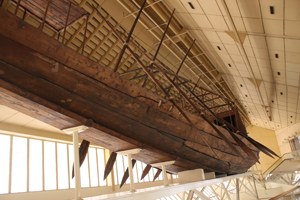 Behind the pyramid of Khufu, there is a separate museum built specifically to house a wooden boat that was excavated from a pit near his tomb. Rebuilt, the boat measures over 140 feet in length and is made of cedar, which remains in excellent condition even 4,500 years later. Designed for the pharaoh to use in the afterlife, the boat was never actually put into water, but instead was constructed, disassembled, and stored in a pit carved into the limestone, and then covered with a series of huge limestone blocks.
Behind the pyramid of Khufu, there is a separate museum built specifically to house a wooden boat that was excavated from a pit near his tomb. Rebuilt, the boat measures over 140 feet in length and is made of cedar, which remains in excellent condition even 4,500 years later. Designed for the pharaoh to use in the afterlife, the boat was never actually put into water, but instead was constructed, disassembled, and stored in a pit carved into the limestone, and then covered with a series of huge limestone blocks.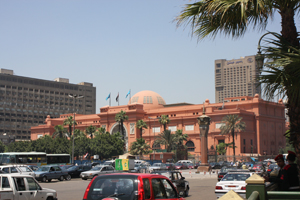
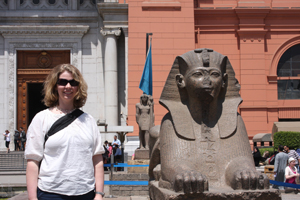
 Our hotel for the next two nights is in Giza, directly across the street from the pyramids and we luck out with a room facing that direction. Since we arrived close to 4pm, it is still plenty light enough to see them towering in front of us directly from our balcony. Definitely one of the most impressive views we have ever had, and a great way to start our time here. At night, they light them up a bit, which makes for a fairly impressive sight.
Our hotel for the next two nights is in Giza, directly across the street from the pyramids and we luck out with a room facing that direction. Since we arrived close to 4pm, it is still plenty light enough to see them towering in front of us directly from our balcony. Definitely one of the most impressive views we have ever had, and a great way to start our time here. At night, they light them up a bit, which makes for a fairly impressive sight.